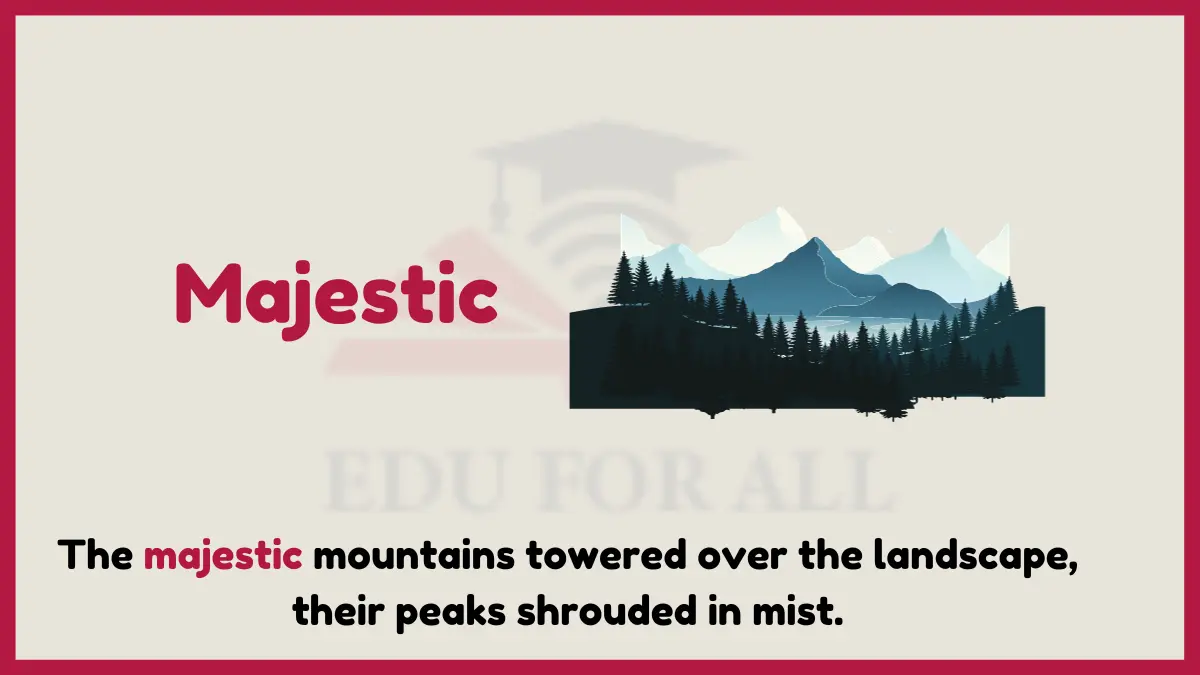Adjectives are words that describe or modify nouns. They provide more information about the noun, such as its size, shape, color, or quality.
For example, in the sentence “The red ball bounced on the playground,” the adjective “red” describes the ball. Other examples of adjectives include “big,” “small,” “tall,” “short,” “happy,” “sad,” “beautiful,” “ugly,” “good,” “bad,” “fast,” and “slow.” Adjectives can be used to make writing more descriptive and engaging.
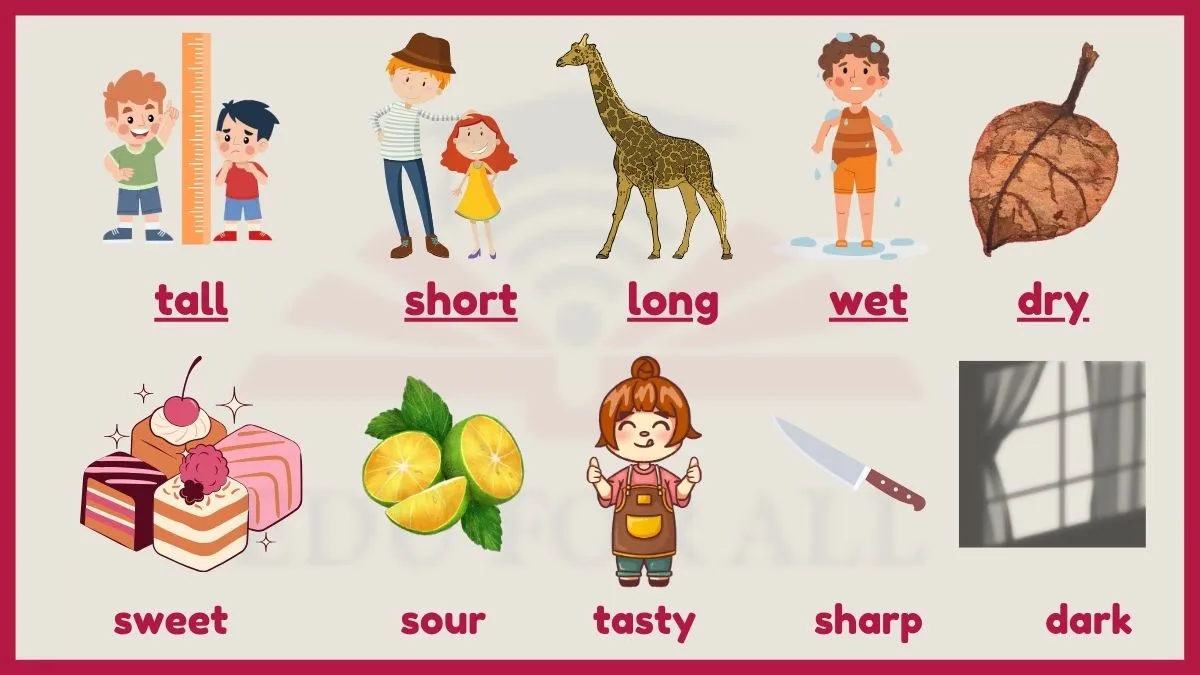
- Examples of Adjective
- 1. Tall
- 2. Small
- 3. Big
- 4. Little
- 5. Old
- 6. New
- 7. Good
- 8. Bad
- 9. Happy
- 10. Sad
- 11. Beautiful
- 13. Slippery
- 13. Cute
- 14. Funny
- 15. Serious
- 16. Silly
- 17. Fast
- 18. Slow
- 19. Loud
- 20. Quiet
- 21. Strong
- 22. Weak
- 24. Cold
- 25. Wet
- 26. Dry
- 27. Soft
- 28. Hard
- 29. Rough
- 30. Smooth
- 31. Fresh
- 32. Stale
- 33. Sweet
- 34. Sour
- 35. Bitter
- 36. Salty
- 38. Spicy
- 39. Bland
- 40. Flavorful
- 41. Tasty
- 42. Delicious
- 43. Light
- 44. Dark
- 45. Bright
- 46. Dull
- 47. Sharp
- 48. Blunt
- 49. Fragrant
- 50. Majestic
Examples of Adjective
Here are 50 examples of adjectives, along with their definitions, usage in phrases, and usage in sentences:
1. Tall
Having a great height compared to others of the same type.
Usage in phrases:
- a tall building
- a tall tree
- a tall person
Usage in sentences:
- The giraffe is the tallest land animal in the world.
- The tall man stood out in the crowd.
- The tall building cast a long shadow over the street.

2. Small
Meaning: Having little size or extent compared to others of the same type.
Usage in phrases:
- a small house
- a small child
- a small car
Usage in sentences:
- The ant is a very small insect.
- The small child was lost in the crowd.
- The small car parked easily in the tight space.
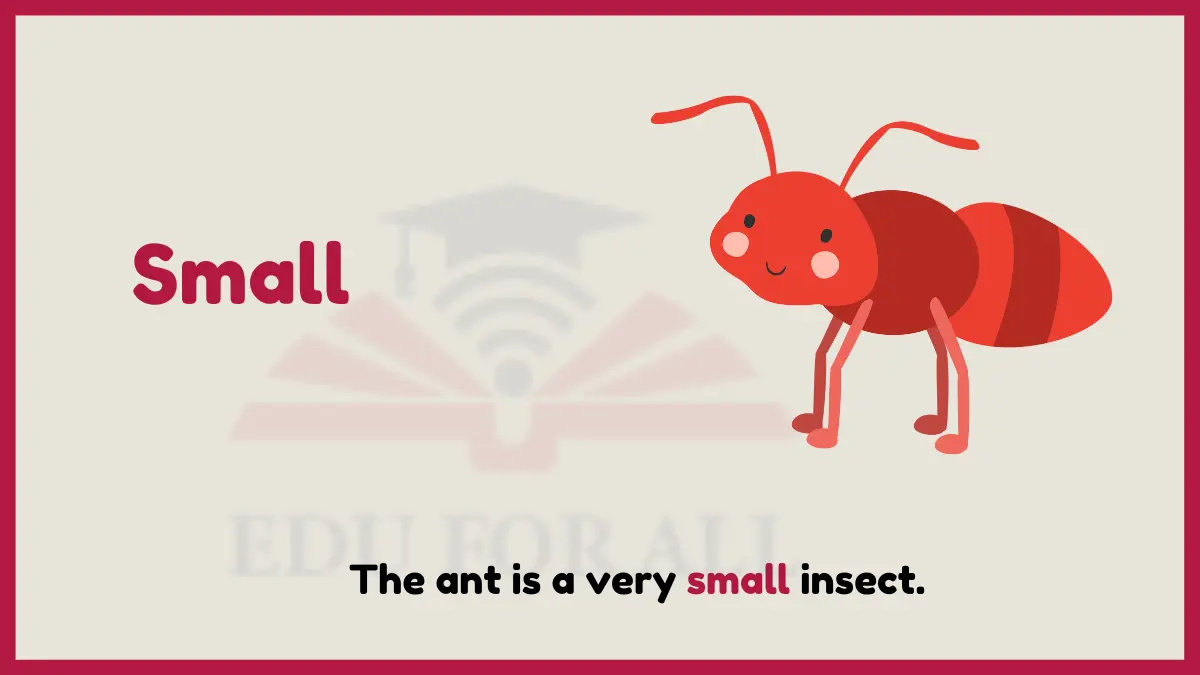
3. Big
Meaning: Large in size or extent.
Usage in phrases:
- a big house
- a big dog
- a big city
Usage in sentences:
- The elephant is a big animal.
- The big dog barked loudly.
- The big city was full of activity.
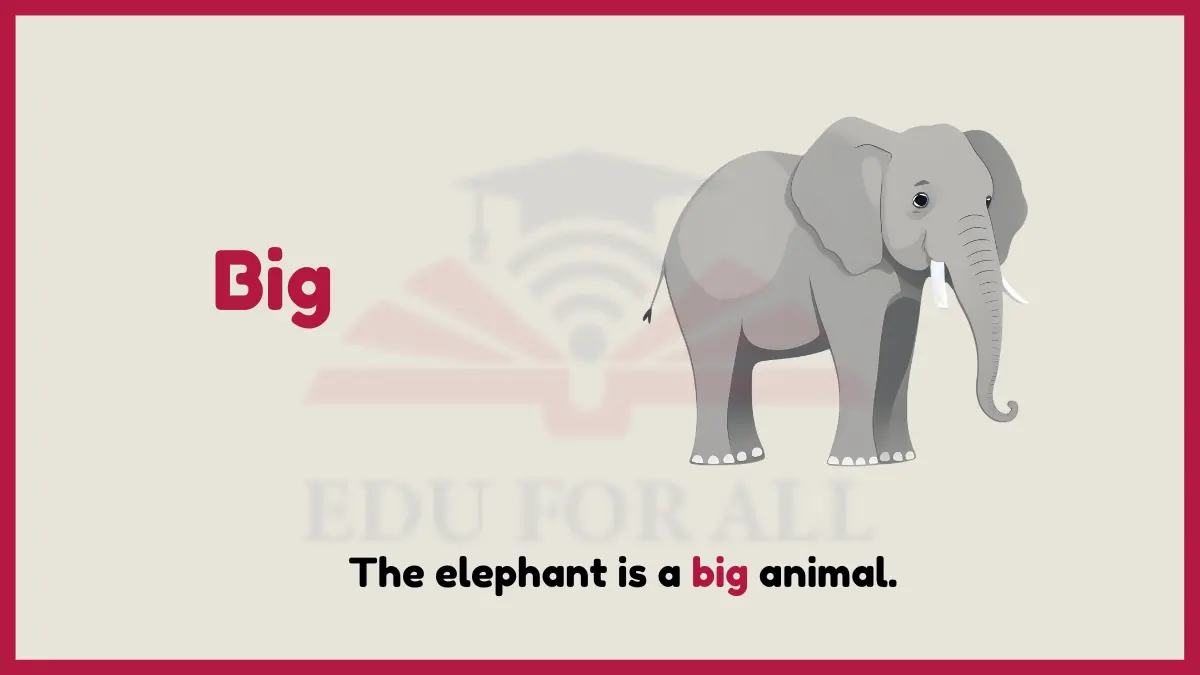
4. Little
Meaning: Small in size or extent.
Usage in phrases:
- a little house
- a little child
- a little car
Usage in sentences:
- The mouse is a little animal.
- The little child was afraid of the dark.
- The little car parked easily in the tight space.
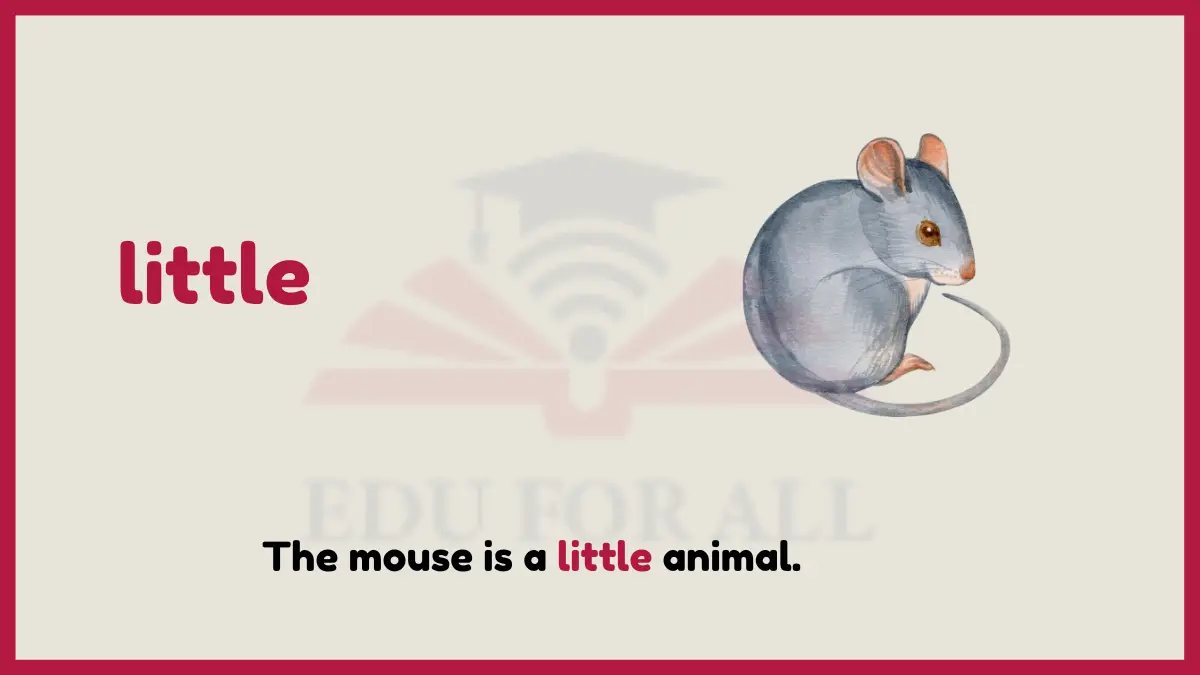
5. Old
Meaning: Having existed for a long time.
Usage in phrases:
- an old house
- an old car
- an old friend
Usage in sentences:
- The old tree had been standing there for centuries.
- The old car was still running after all these years.
- I haven’t seen my old friend in years.

6. New
Meaning: Recently made or discovered.
Usage in phrases:
- a new house
- a new car
- a new friend
Usage in sentences:
- I moved into my new house last week.
- I bought a new car last year.
- I made a new friend at school.

7. Good
Meaning: Having desirable qualities or qualities considered to be excellent.
Usage in phrases:
- a good book
- a good meal
- a good friend
Usage in sentences:
- This is a good book to read.
- I had a good meal at the restaurant last night.
- He is a good friend to have.

8. Bad
Meaning: Not good or having undesirable qualities or qualities considered to be poor.
Usage in phrases:
- a bad book
- a bad meal
- a bad friend
Usage in sentences:
- This is a bad book to read.
- I had a bad meal at the restaurant yesterday.
- He is a bad friend to have.

9. Happy
Meaning: Feeling or showing pleasure or contentment.
Usage in phrases:
- a happy face
- a happy child
- a happy home
Usage in sentences:
- She has a happy face.
- The child was happy to be playing in the park.
- They have a happy home.

10. Sad
Meaning: Feeling or showing sorrow or unhappiness.
Usage in phrases:
- a sad face
- a sad child
- a sad song
Usage in sentences:
- She has a sad face.
- The child was sad because his dog died.
- They played a sad song at the funeral.

11. Beautiful
Meaning: Pleasing the senses or mind aesthetically.
Usage in phrases:
- a beautiful flower
- a beautiful woman
- a beautiful painting
Usage in sentences:
- She is a beautiful woman.
- The painting is a beautiful work of art.
- The sunset was a beautiful sight.

13. Slippery
Meaning: Causing or likely to cause slipping.
Usage in phrases:
- slippery road
- slippery floor
- slippery slope
Usage in sentences:
- It was dangerous to drive on the slippery road after the rain.
- Be careful not to fall on the slippery floor.
- He is on a slippery slope that could lead to addiction.
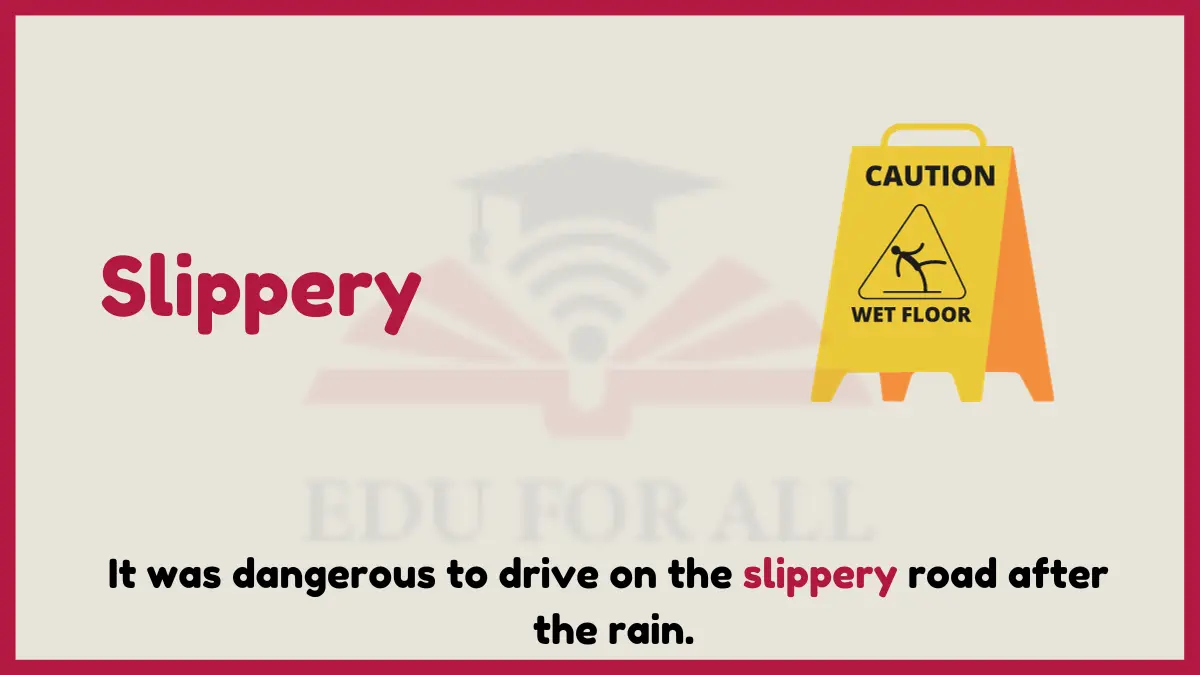
13. Cute
Meaning: Attractive or appealing in a way that is considered charming or delightful.
Usage in phrases:
- a cute baby
- a cute animal
- a cute outfit
Usage in sentences:
- The baby is so cute!
- The kitten is a cute little thing.
- She wore a cute outfit to the party.
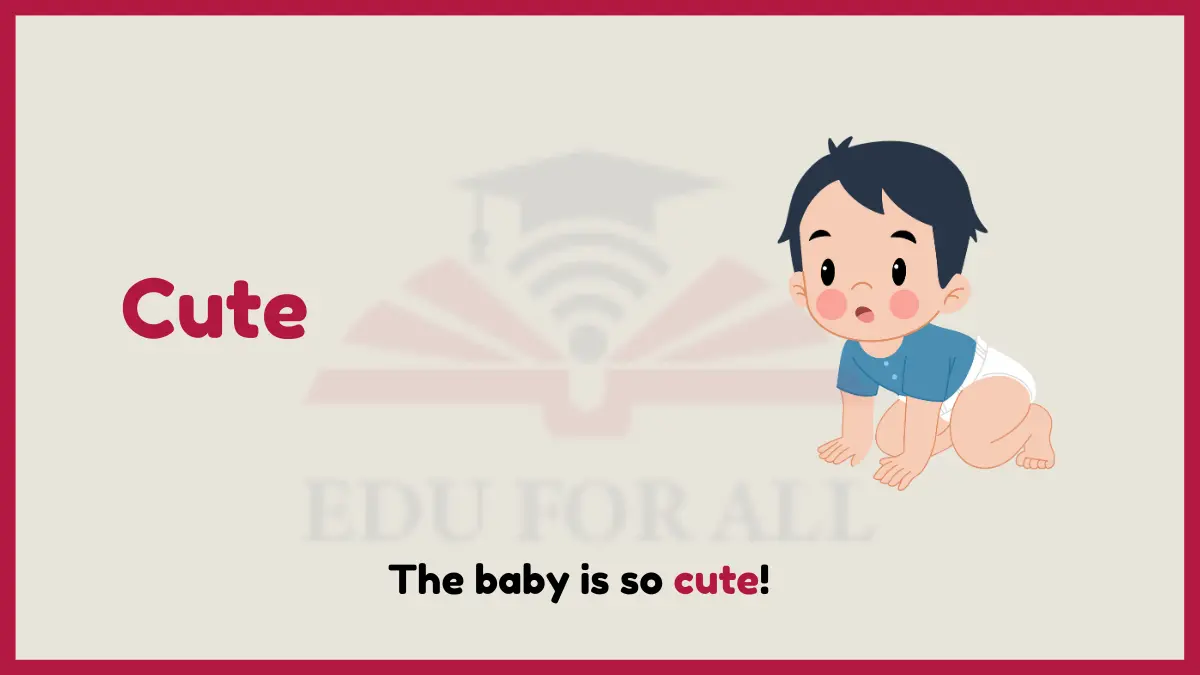
14. Funny
Meaning: Causing amusement or laughter.
Usage in phrases:
- a funny story
- a funny joke
- a funny face
Usage in sentences:
- I told a funny story to the kids.
- The joke was so funny that I couldn’t stop laughing.
- He made a funny face at the baby.

15. Serious
Meaning: Solemn or dignified in manner or character.
Usage in phrases:
- a serious look
- a serious tone
- a serious discussion
Usage in sentences:
- She had a serious look on her face.
- He spoke in a serious tone.
- They had a serious discussion about the problem.

16. Silly
Meaning: Lacking sense or reason; stupid or absurd.
Usage in phrases:
- a silly mistake
- a silly question
- a silly grin
Usage in sentences:
- She made a silly mistake.
- He asked a silly question.
- She had a silly grin on her face.
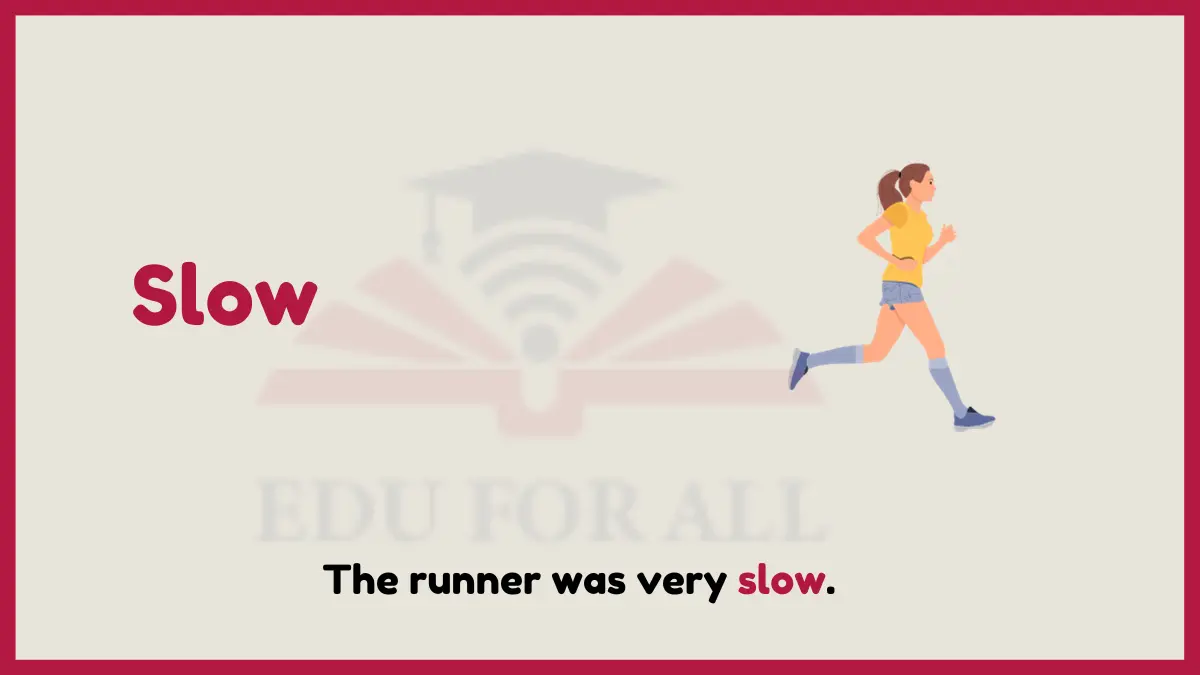
17. Fast
Meaning: Moving, acting, or occurring quickly.
Usage in phrases:
- a fast car
- a fast runner
- a fast pace
Usage in sentences:
- The car was going very fast.
- The runner was very fast.
- They walked at a fast pace.

18. Slow
Meaning: Moving, acting, or occurring at a low speed.
Usage in phrases:
- a slow car
- a slow runner
- a slow pace
Usage in sentences:
- The car was going very slow.
- The runner was very slow.
- They walked at a slow pace.
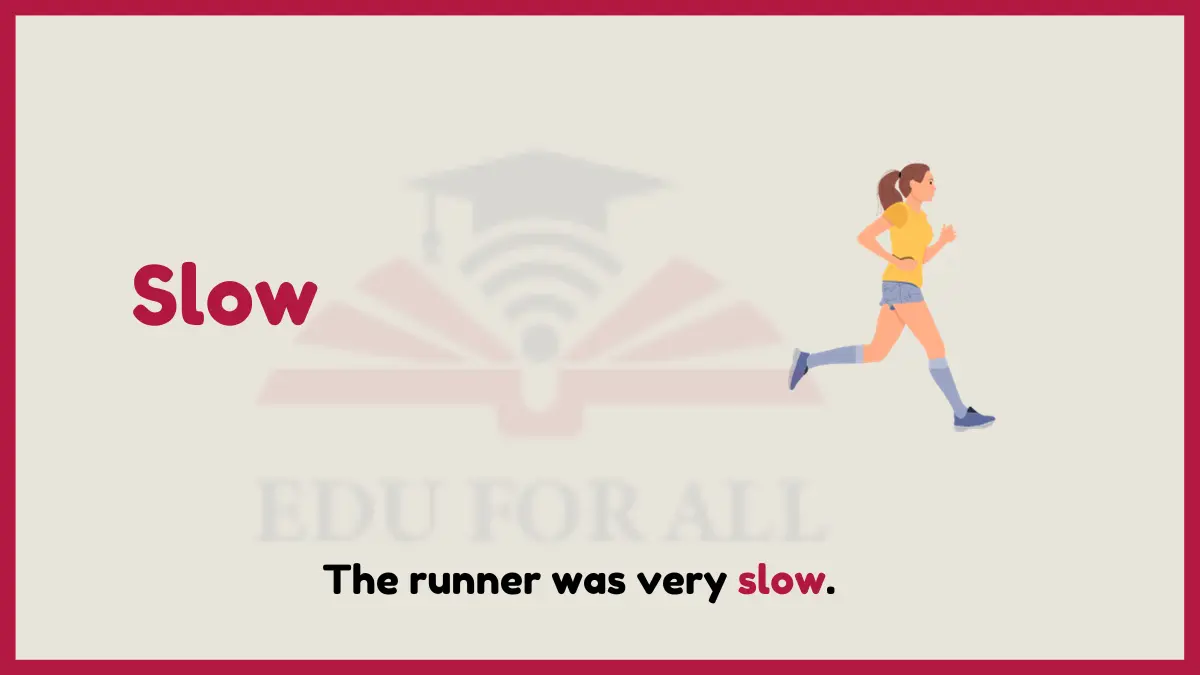
19. Loud
Meaning: Making a lot of noise.
Usage in phrases:
- a loud voice
- a loud music
- a loud bang
Usage in sentences:
- She has a loud voice.
- The music was too loud.
- I heard a loud bang.

20. Quiet
Meaning: Making little or no noise.
Usage in phrases:
- a quiet voice
- a quiet place
- a quiet time
Usage in sentences:
- She has a quiet voice.
- The library was a quiet place.
- We had a quiet time at home.
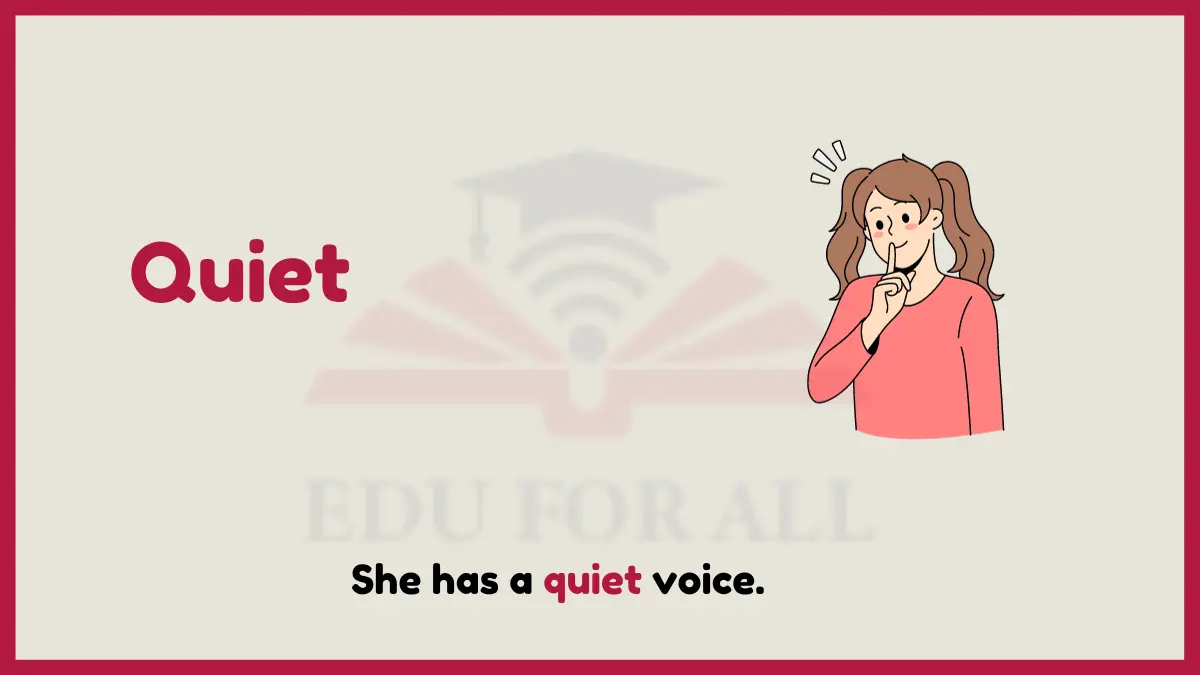
21. Strong
Meaning: Having great physical power.
Usage in phrases:
- a strong man
- a strong horse
- a strong wind
Usage in sentences:
- He is a strong man.
- The horse pulled the carriage with strong legs.
- The wind blew with strong gusts.

22. Weak
Meaning: Lacking physical power.
Usage in phrases:
- a weak man
- a weak horse
- a weak wind
Usage in sentences:
- He is a weak man.
- The horse was too weak to pull the carriage.
- The wind was too weak to blow over the trees.

24. Cold
Meaning: Having a low temperature.
Usage in phrases:
- a cold day
- a cold drink
- a cold room
Usage in sentences:
- It was a cold day outside.
- I had a cold drink of water.
- The room was cold and empty.
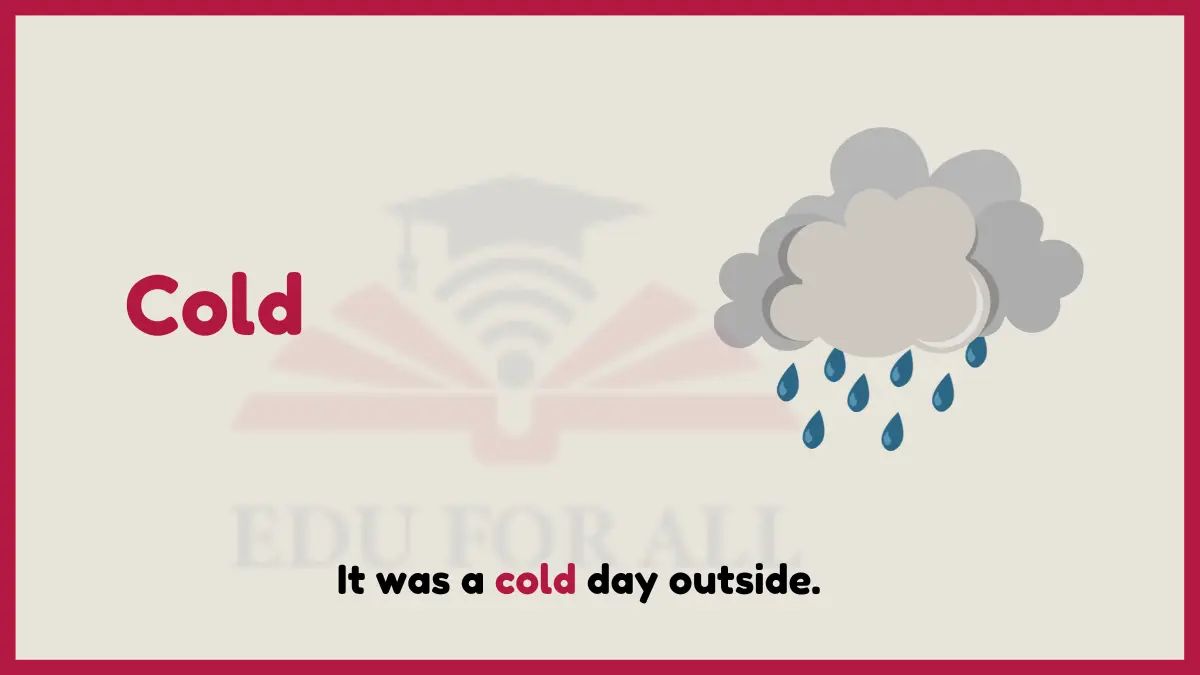
25. Wet
Meaning: Covered or soaked with water.
Usage in phrases:
- a wet dog
- a wet towel
- a wet road
Usage in sentences:
- The dog was wet from swimming.
- I dried the wet towel.
- The road was wet from the rain.

26. Dry
Meaning: Not wet or containing moisture.
Usage in phrases:
- a dry dog
- a dry towel
- a dry road
Usage in sentences:
- The dog was dry from sunbathing.
- I hung the wet towel to dry.
- The road was dry after the rain.
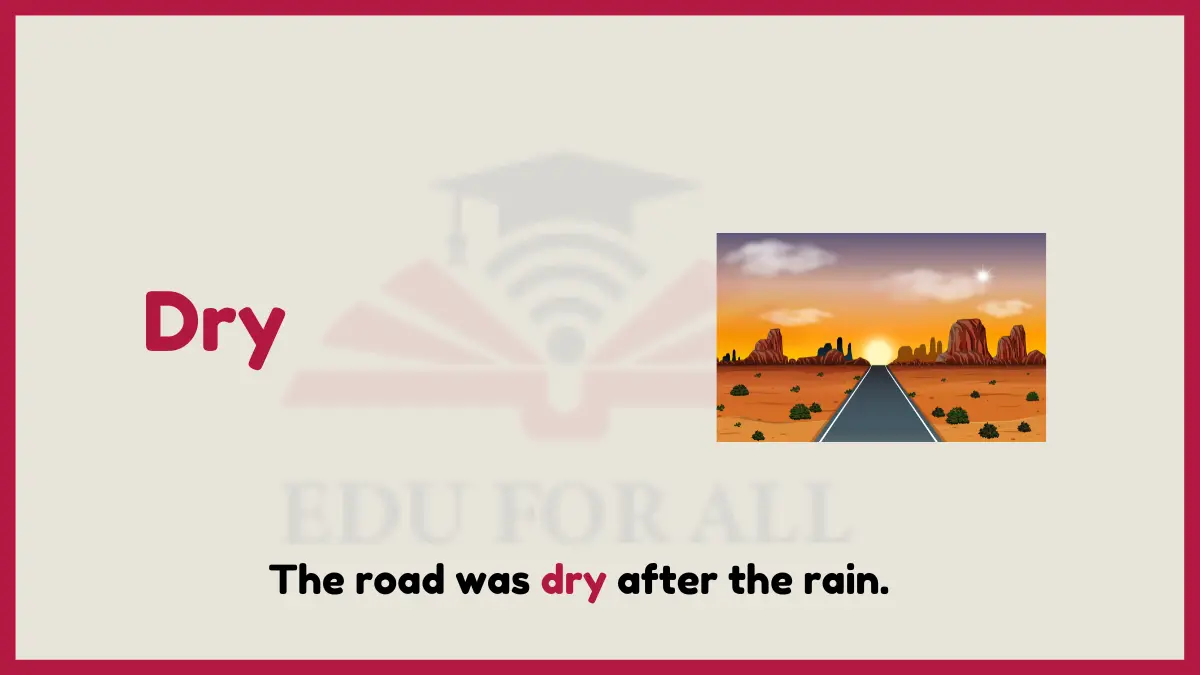
27. Soft
Meaning: Yielding easily to pressure; not hard or firm.
Usage in phrases:
- a soft pillow
- a soft blanket
- a soft voice
Usage in sentences:
- I had a soft pillow to sleep on.
- I wrapped myself in a soft blanket.
- She spoke in a soft voice.

28. Hard
Meaning: Not yielding easily to pressure; firm or solid.
Usage in phrases:
- a hard rock
- a hard chair
- a hard voice
Usage in sentences:
- I threw a hard rock at the tree.
- I sat on a hard chair.
- He spoke in a hard voice.

29. Rough
Meaning: Having an uneven or irregular surface.
Usage in phrases:
- a rough road
- a rough texture
- a rough voice
Usage in sentences:
- The road was rough and bumpy.
- The texture of the fabric was rough and scratchy.
- He has a rough and gravelly voice.

30. Smooth
Meaning: Having an even or regular surface.
Usage in phrases:
- a smooth road
- a smooth texture
- a smooth voice
Usage in sentences:
- The road was smooth and paved.
- The texture of the silk was smooth and soft.
- She has a smooth and soothing voice.

31. Fresh
Meaning: New or recently made, obtained, or produced.
Usage in phrases:
- fresh air
- fresh fruit
- fresh paint
Usage in sentences:
- I opened the window to let in some fresh air.
- I bought some fresh fruit at the market.
- The room smelled of fresh paint.

32. Stale
Meaning: Not fresh or no longer good.
Usage in phrases:
- stale bread
- stale air
- stale jokes
Usage in sentences:
- The bread was stale and moldy.
- The air in the room was stale and stuffy.
- He told some old and stale jokes.
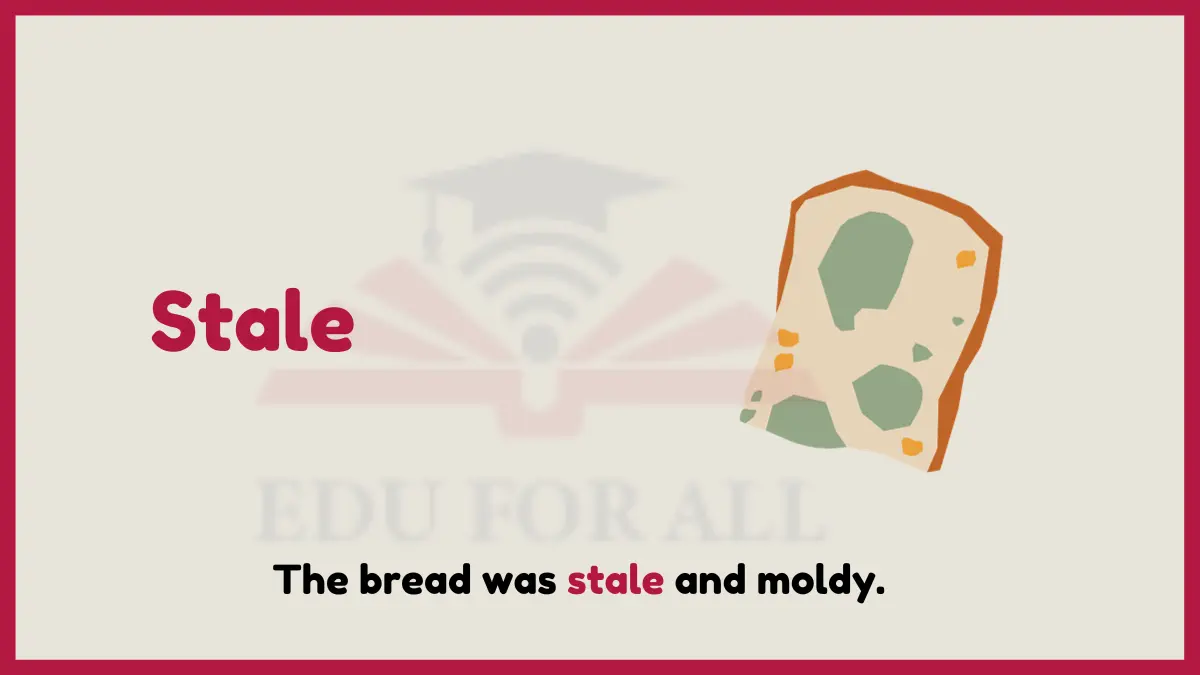
33. Sweet
Meaning: Having a pleasant taste similar to that of sugar.
Usage in phrases:
- sweet candy
- sweet perfume
- sweet voice
Usage in sentences:
- I love the sweet taste of candy.
- She wore a sweet perfume.
- He has a sweet and melodious voice.
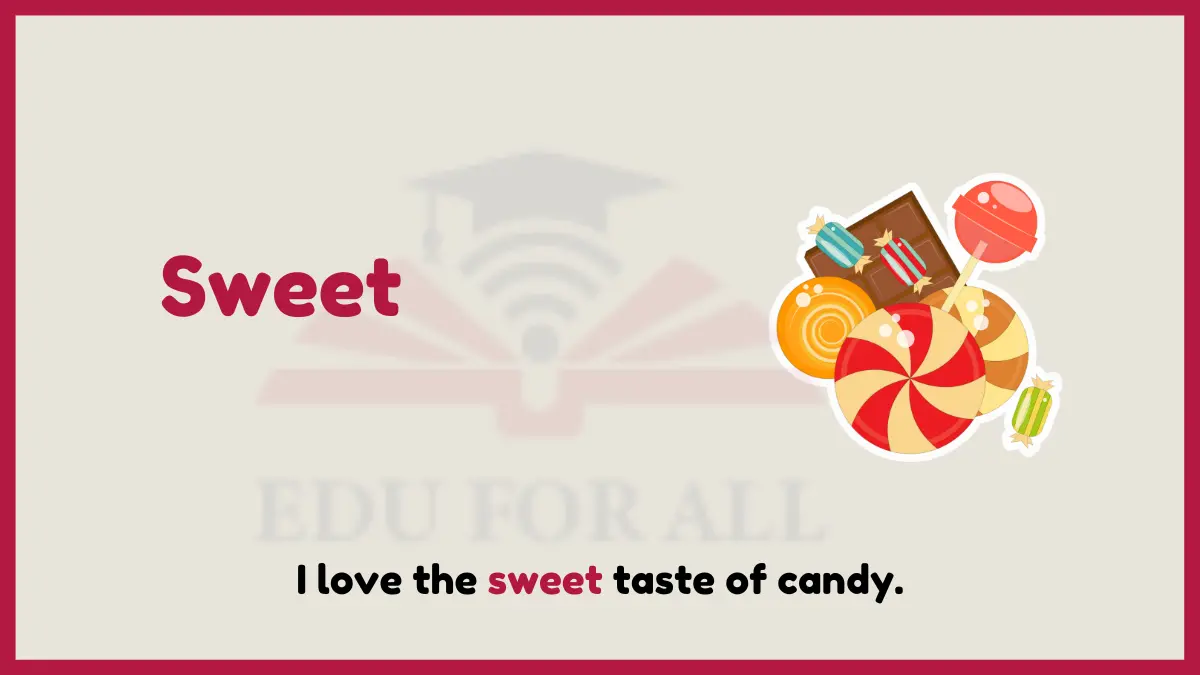
34. Sour
Meaning: Having a sharp, tangy taste.
Usage in phrases:
- sour lemon
- sour milk
- sour expression
Usage in sentences:
- The lemon was too sour to eat.
- The milk had gone sour.
- She had a sour expression on her face.
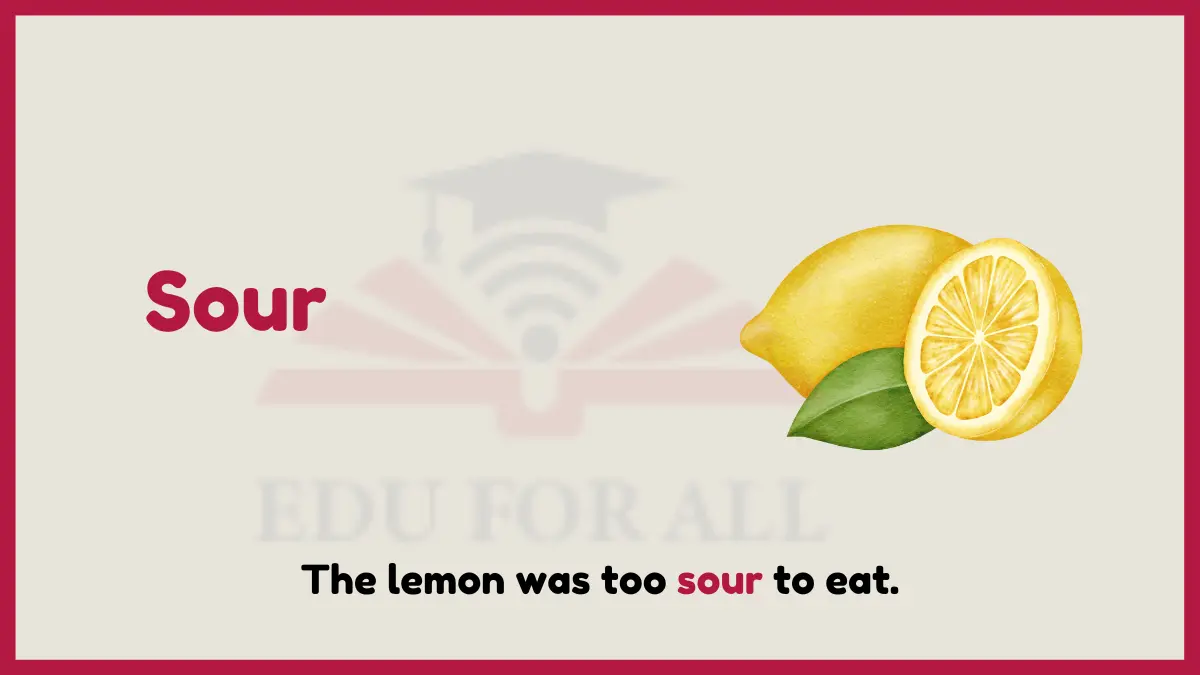
35. Bitter
Meaning: Having a harsh, unpleasant taste.
Usage in phrases:
- bitter coffee
- bitter chocolate
- bitter words
Usage in sentences:
- I don’t like the bitter taste of coffee.
- The chocolate was too bitter for my taste.
- He spoke bitter words to his friend.

36. Salty
Meaning: Having the taste of salt.
Usage in phrases:
- salty popcorn
- salty sea water
- salty tears
Usage in sentences:
- I love the salty taste of popcorn.
- The sea water was salty and refreshing.
- She cried salty tears of sadness.
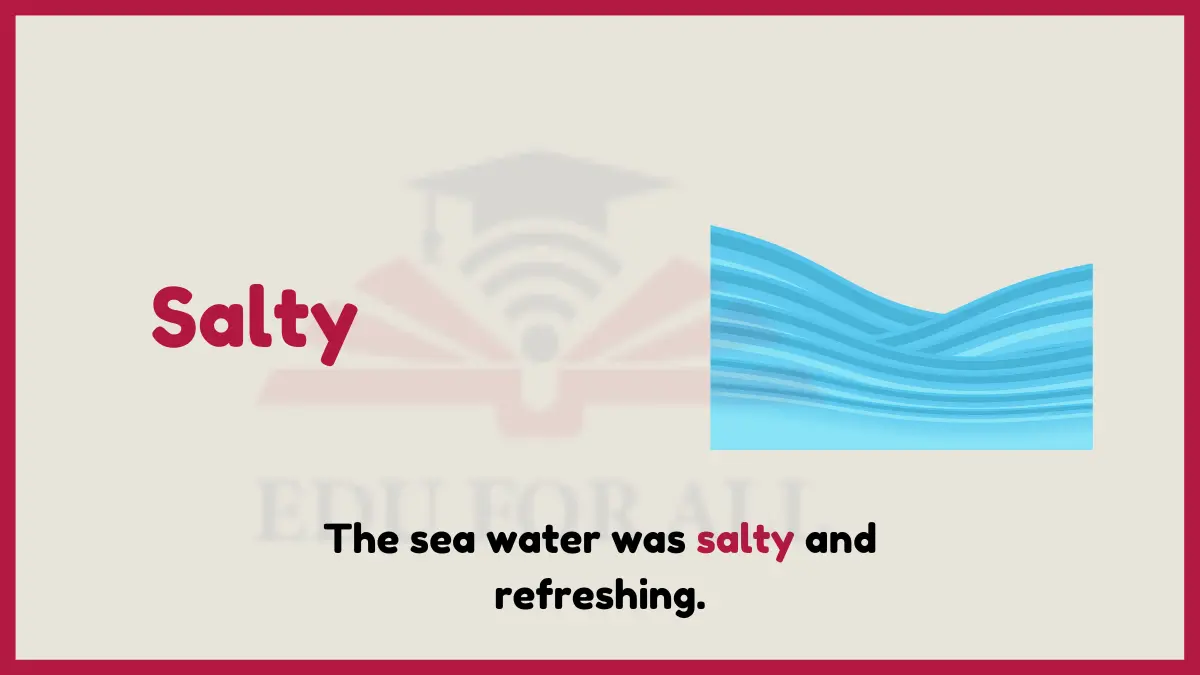
38. Spicy
Meaning: Having a sharp, hot taste caused by pepper or other spices.
Usage in phrases:
- spicy curry
- spicy chili peppers
- spicy perfume
Usage in sentences:
- I love the spicy flavor of curry.
- The chili peppers were too spicy for me.
- She wore a spicy perfume that lingered in the air.

39. Bland
Meaning: Lacking flavor or interest.
Usage in phrases:
- bland food
- bland conversation
- bland personality
Usage in sentences:
- The food was so bland that I couldn’t eat it.
- The conversation was so bland that I fell asleep.
- He has a bland personality that doesn’t make much of an impression.
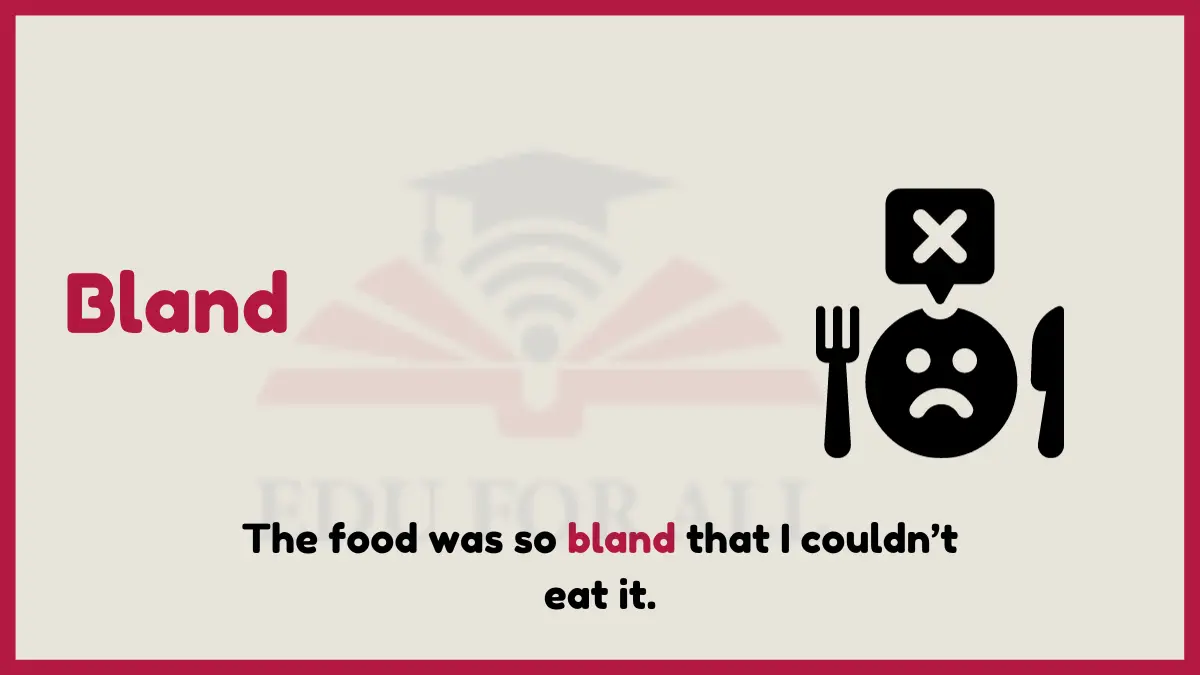
40. Flavorful
Meaning: Having a strong, distinctive taste.
Usage in phrases:
- flavorful food
- flavorful wine
- flavorful conversation
Usage in sentences:
- The food was so flavorful that I savored every bite.
- The wine was full-bodied and flavorful.
- They had a lively and flavorful conversation that kept me engaged.
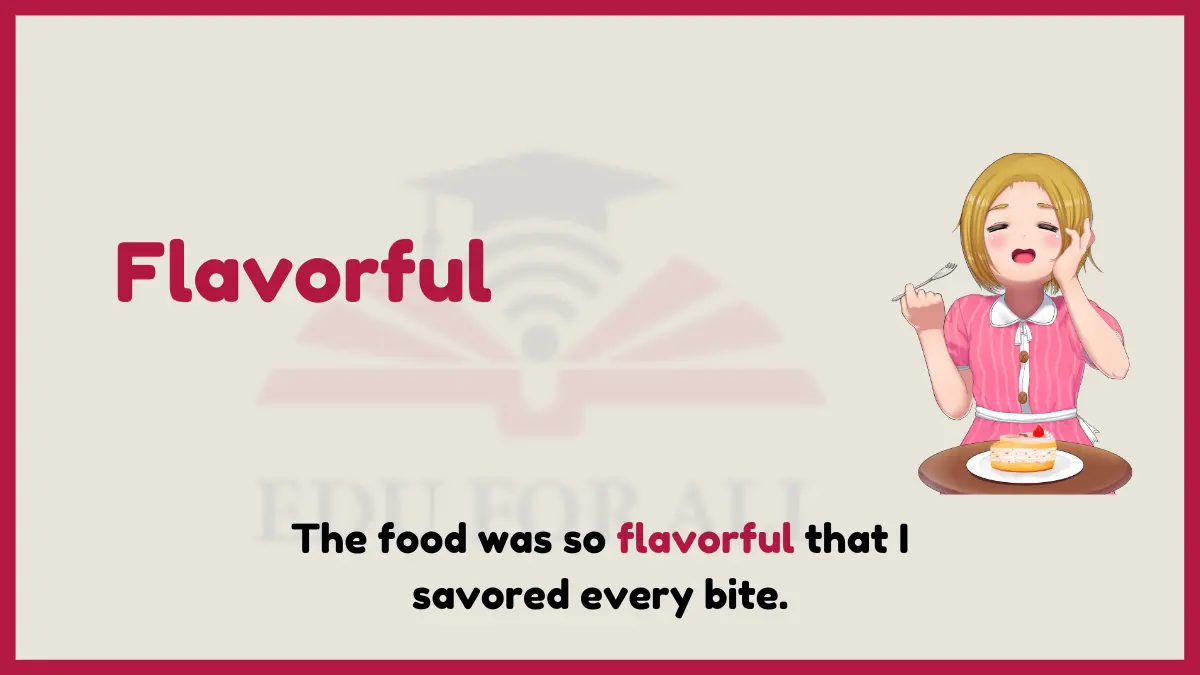
41. Tasty
Meaning: Pleasing to the sense of taste; delicious.
Usage in phrases:
- tasty food
- tasty dessert
- tasty treat
Usage in sentences:
- The food was so tasty that I couldn’t stop eating.
- The dessert was a decadent and tasty indulgence.
- I love to treat myself to a tasty snack every now and then.
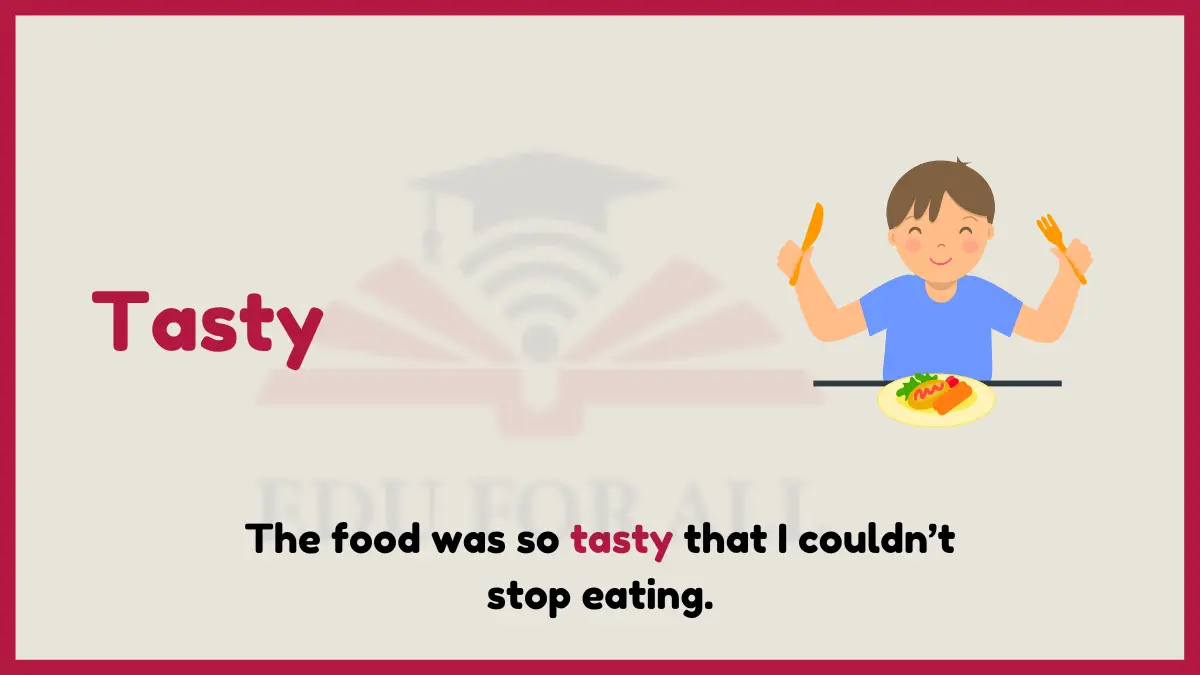
42. Delicious
Meaning: Extremely pleasing to the sense of taste; very tasty.
Usage in phrases:
- delicious food
- delicious meal
- delicious experience
Usage in sentences:
- The food was absolutely delicious.
- I had a delicious meal at my favorite restaurant.
- Traveling the world has been a delicious culinary adventure.
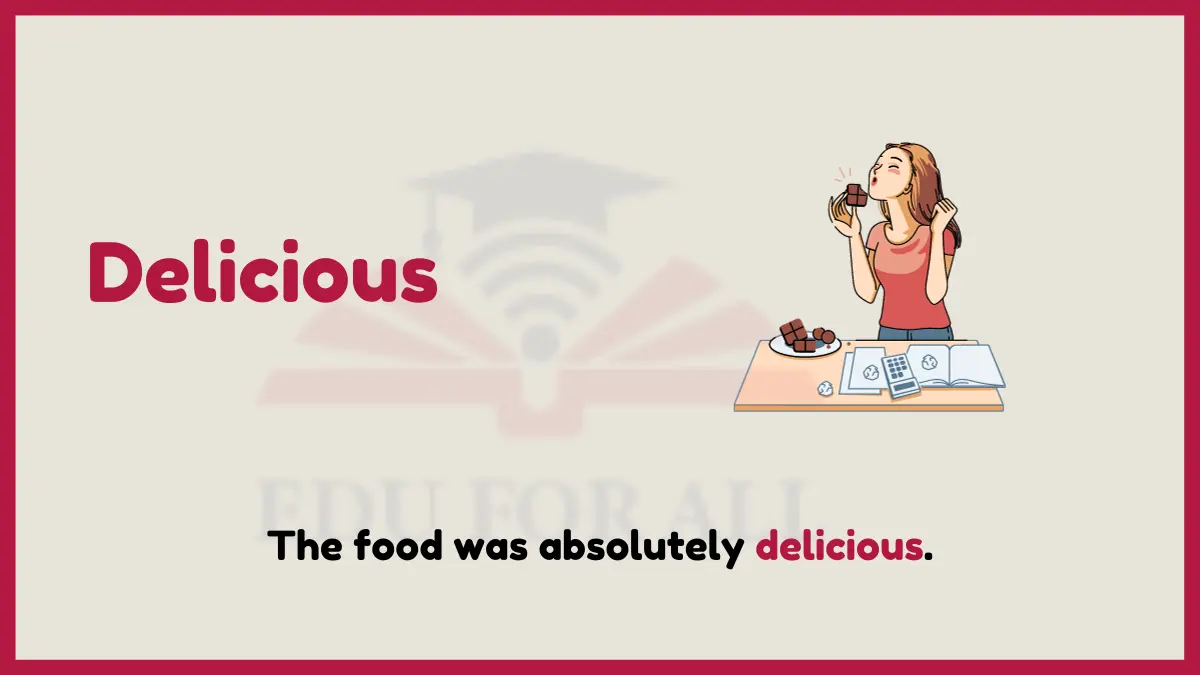
43. Light
Meaning: Not heavy or dark.
Usage in phrases:
- light fabric
- light color
- light mood
Usage in sentences:
- She wore a light and airy dress on a hot summer day.
- The room was painted in a light and cheerful shade of yellow.
- They were in a light and playful mood after their victory.
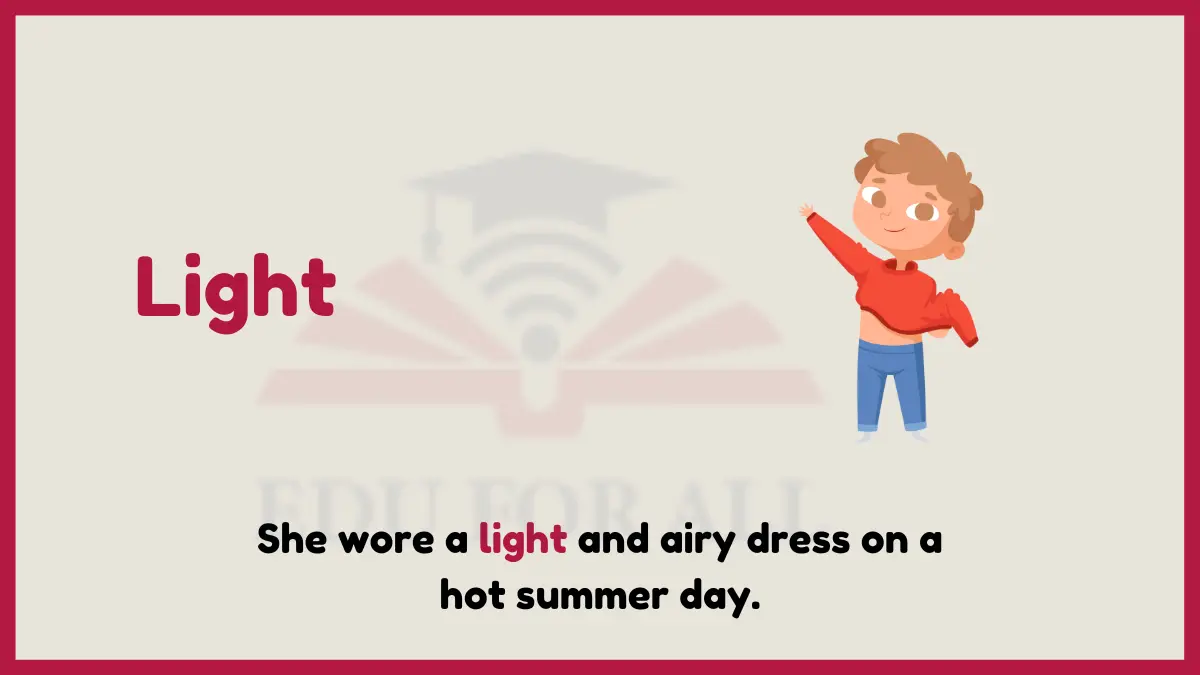
44. Dark
Meaning: Having little or no light.
Usage in phrases:
- dark room
- dark chocolate
- dark mood
Usage in sentences:
- I couldn’t see anything in the dark room.
- I savored the rich and intense flavor of dark chocolate.
- He was in a dark and brooding mood after his breakup.

45. Bright
Meaning: Shining with a clear, steady light.
Usage in phrases:
- bright sun
- bright smile
- bright personality
Usage in sentences:
- The sun shone brightly on the beach.
- She had a warm and infectious smile that lit up her face.
- He has a bright and outgoing personality that draws people to him.

46. Dull
Meaning: Not bright or shining.
Usage in phrases:
- dull knife
- dull pain
- dull conversation
Usage in sentences:
- The knife was so dull that it couldn’t cut through the tomato.
- The pain was a dull ache that lingered for hours.
- The conversation was so dull that I checked my watch every few minutes.

47. Sharp
Meaning: Having a keen edge or point.
Usage in phrases:
- sharp knife
- sharp mind
- sharp wit
Usage in sentences:
- I used a sharp knife to slice the bread.
- She has a sharp mind and a knack for solving problems.
- He has a sharp wit that makes people laugh until their sides ache.
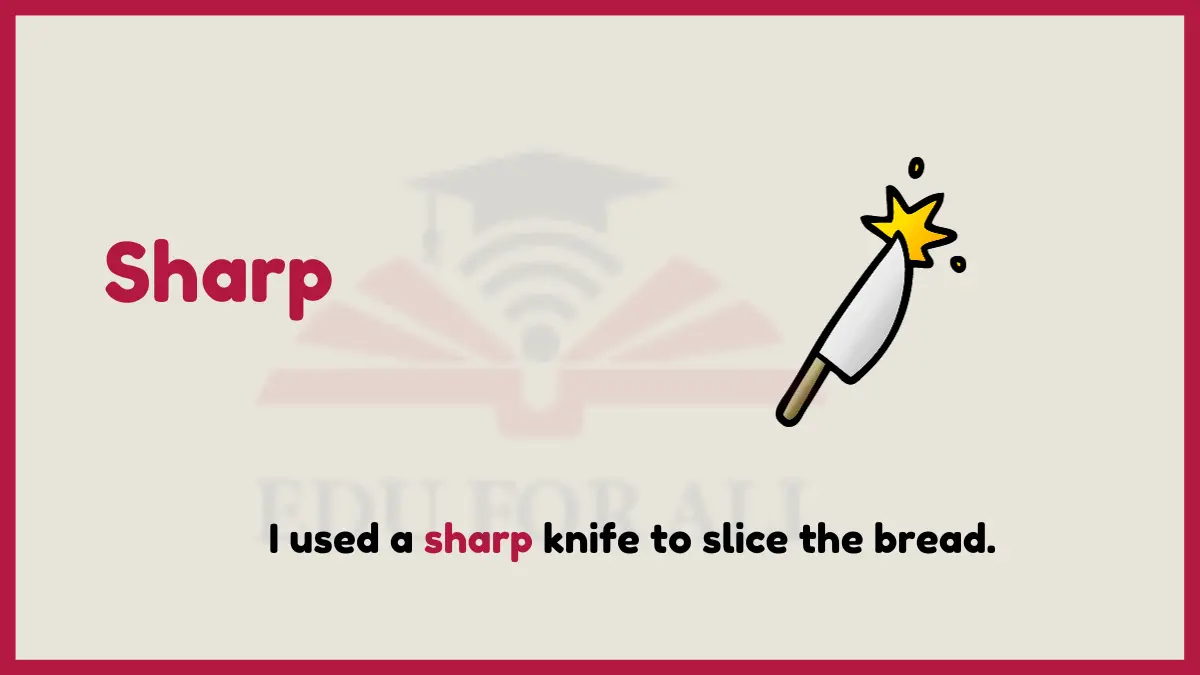
48. Blunt
Meaning: Not sharp or pointed.
Usage in phrases:
- blunt knife
- blunt instrument
- blunt question
Usage in sentences:
- The knife was so blunt that it couldn’t even cut through butter.
- He used a blunt instrument to break open the window.
- She asked a blunt question that made everyone feel uncomfortable.
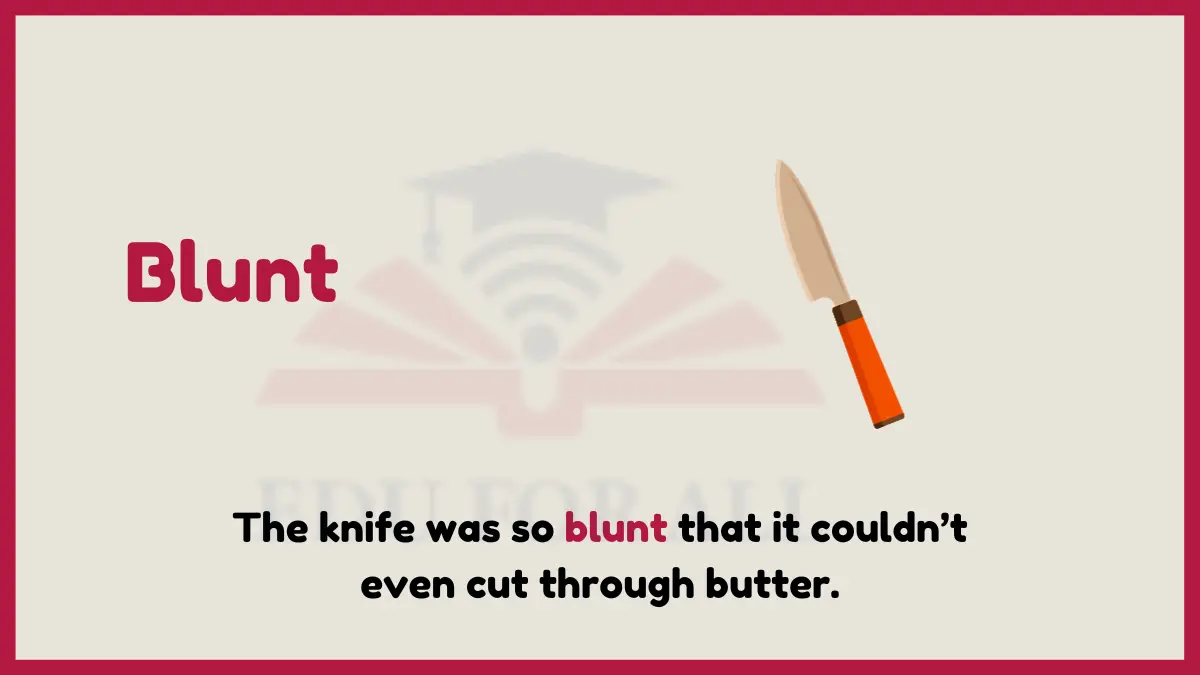
49. Fragrant
Meaning: Having a pleasant smell.
Usage in phrases:
- fragrant flowers
- fragrant herbs
- fragrant spices
Usage in sentences:
- The fragrant roses filled the air with their sweet perfume.
- The gardener carefully tended to her fragrant herb garden.
- A sprinkle of cinnamon added a warm and fragrant touch to the dish.
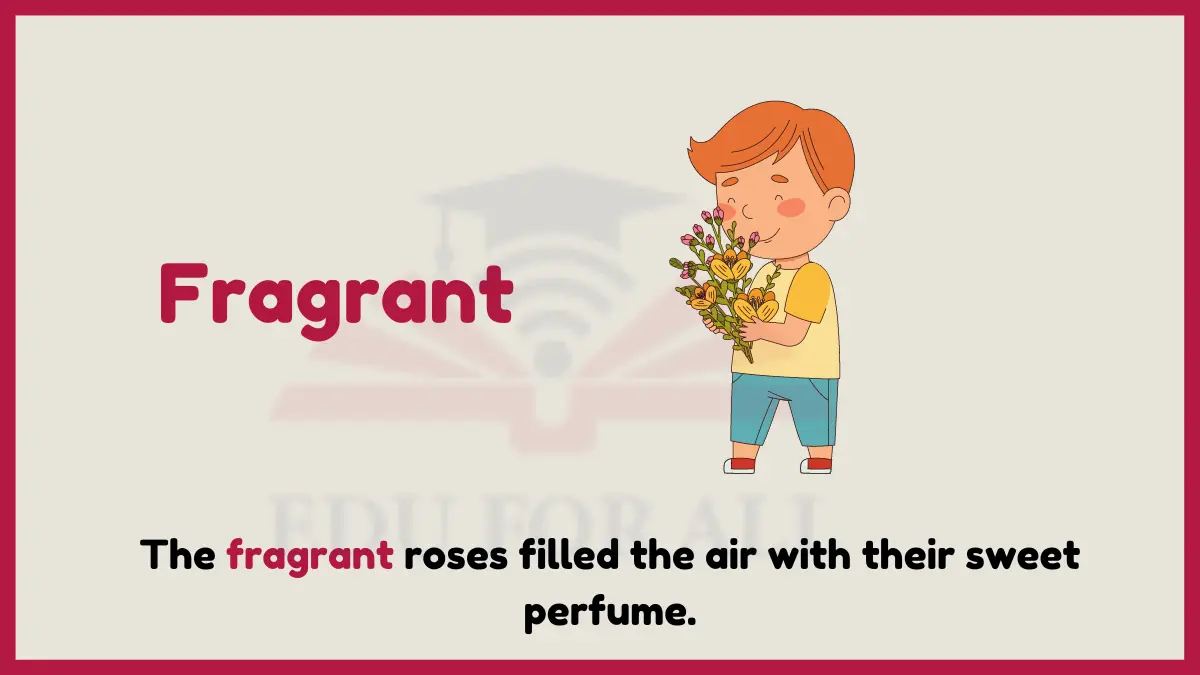
50. Majestic
Meaning: Grand and imposing in appearance or character.
Usage in phrases:
- majestic mountains
- majestic forest
- majestic waterfall
Usage in sentences:
- The majestic mountains towered over the landscape, their peaks shrouded in mist.
- The majestic forest stretched for miles, a tapestry of towering trees and vibrant undergrowth.
- The majestic waterfall cascaded down the cliffside, its thunderous roar echoing through the valley.
